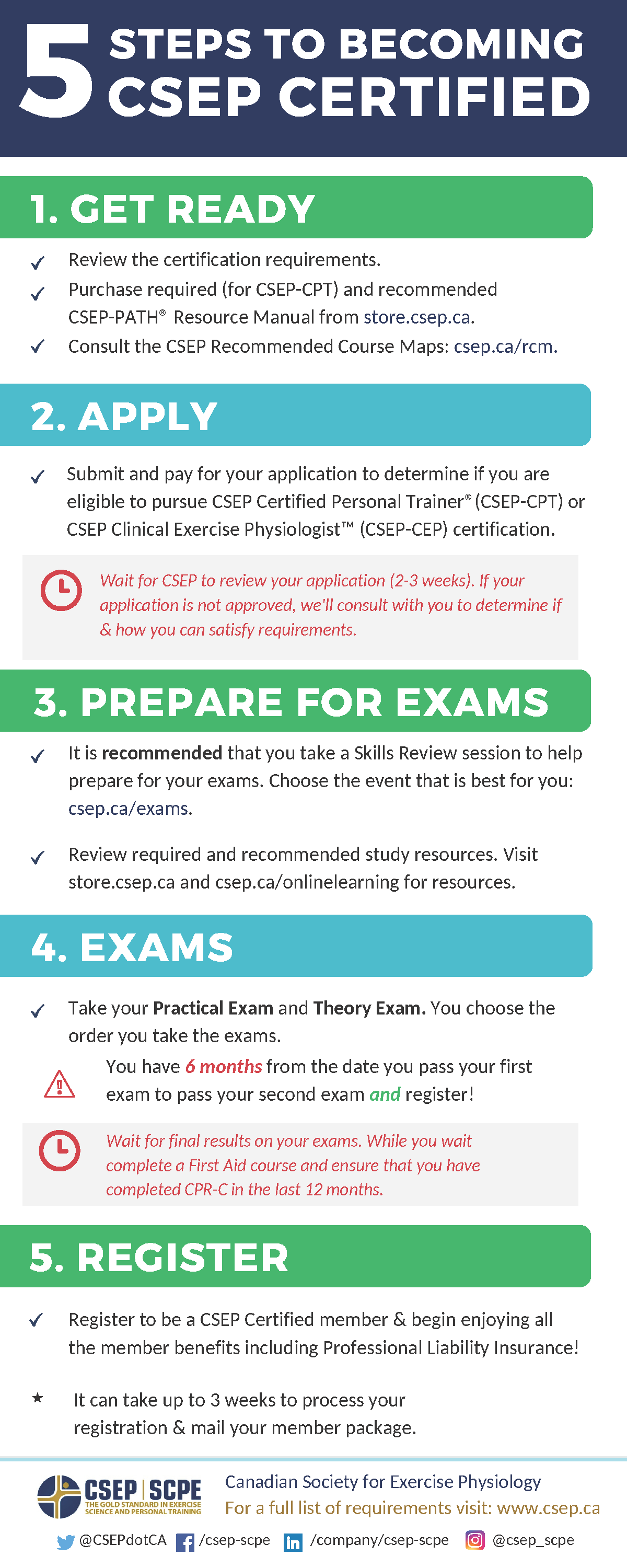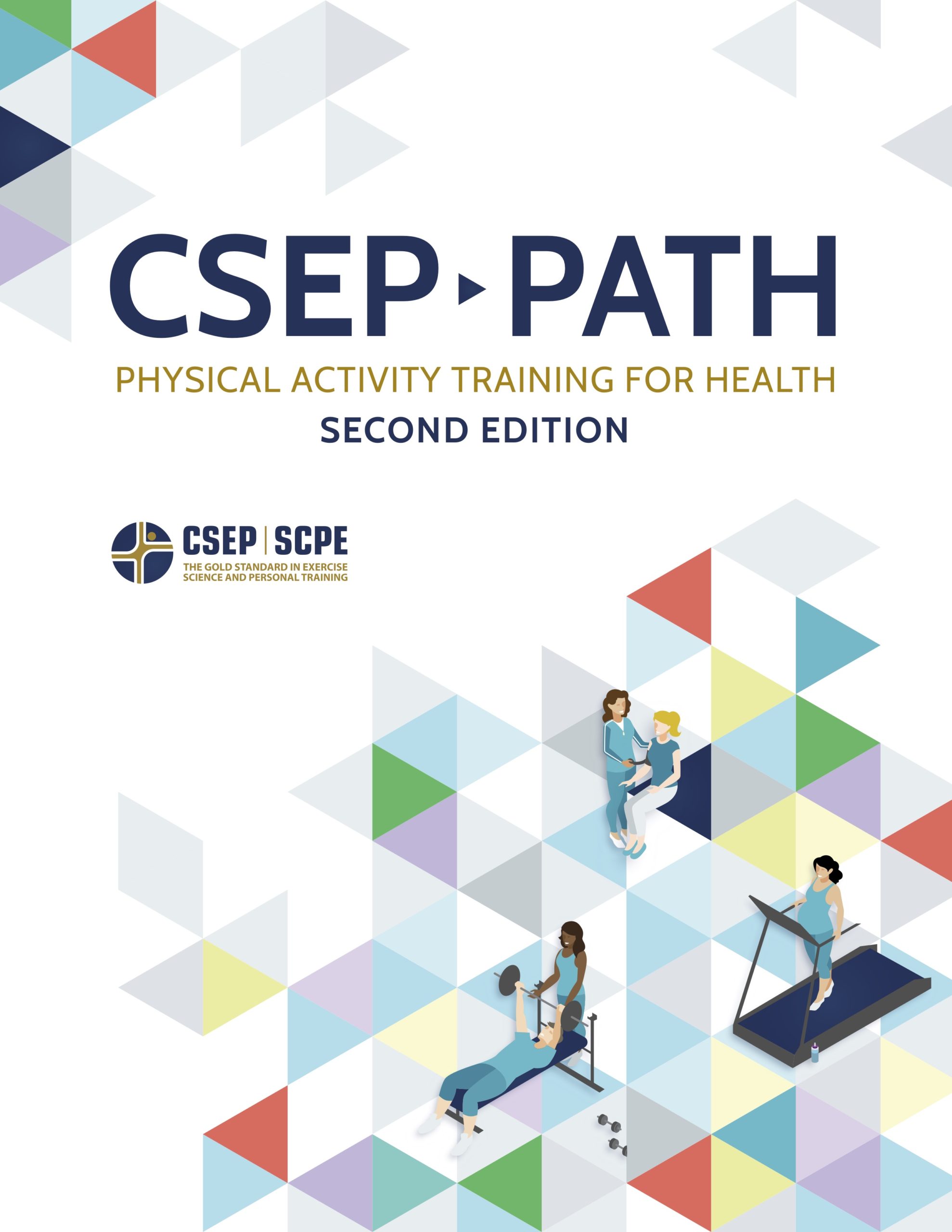Academic Requirements
All CSEP certifications have specific academic requirements that need to be met to be eligible to challenge the exams. CSEP-CPT applicants must show they have, at a minimum, the equivalent of two years of full-time study (or 60 credits) at the post-secondary level, in a related field. Applicants must show they have completed this requirement through any one of the following:
- Graduation from an appropriate two-year College Diploma program;
- Through university or college coursework toward graduation in an appropriate program; or
- From a combination of completed CEGEP DEC in the Pre-University Science stream and courses in an appropriate Bachelor degree (must show that at least one year of full-time study / 30 credits come from the university system).
Examples of appropriate programs that meet the education requirements include, but are not limited to: Human Kinetics, Kinesiology, Physical Education, Fitness and Health Promotion, or Exercise Science.
Core Competencies
There are six core competencies a CSEP-CPT Candidate is expected to demonstrate in order to be successful with the Theory and Practical Exams and practice as a CSEP-CPT. Candidates will apply the knowledge and skills from course taken in their post-secondary education to address the Core Competencies.
- Human Anatomy, Human Physiology and Exercise Physiology
- Theory and Methods of Behaviour Modification
- Theory and Methods of Health-Related Physical Activity & Physical Fitness Assessments
- Theory and Methods of Health-Related Exercise Prescription and Program Design
- Safety and Emergency Procedures
- Documentation, Administration and Professionalism
For a detailed explanation of all the Core Competencies, associated skills and where you can find the information on it in the CSEP-PATH® purchase the CSEP-CPT Certification & Study Guide.
CSEP Recommended Course Maps
To assist applicants and candidates in planning their education to support their certification goals we have developed CSEP Recommended Course Maps (RCM). CSEP RCMs are a resource to help interested applicants plan your courses to ensure you take ones that cover the knowledge that will be challenged in the exams.
This is a tool developed in conjunction with a number of institutions to identify academic courses that cover content in the CSEP-CPT core competencies. There may be other courses that will meet the Core Competencies, therefore CSEP RCMs aim to be a tool to support your success and not a prescriptive outline.
Application & Certification Process

There are five steps to becoming a CSEP-CPT:
- Get Ready: Ensure you review the requirements and purchase the required resources.
- Apply: To challenge the CSEP-CPT Theory and Practical Exams all applicants must submit an online application and be approved by CSEP. In the application CSEP-CPT applicants will be required to upload a transcript and pay the application fee ($45.00 as of April 2019).
- Prepare for Exams: It is important to ensure you are well prepared to challenge the exams. In addition to the CSEP study resources and your course materials it is recommended that you take a Skills Review Session.
- Exams: Candidates must successfully challenge a Practical Exam and a Theory Exam. Candidates choose the order they take the exams but they have 6 months from the date of passing the first exam to pass the second exam and register as a CSEP-CPT.
- Register to be a CSEP certified member! To register candidates, need to submit proof of emergency first-aid, hold a current / valid CPR Level C and pay the membership fees.
Required Resource – CSEP Physical Activity Training for Health® Resource Manual (CSEP-PATH®)
All CSEP-CPT candidates are required to purchase the CSEP-PATH® Resource Manual to pursue their certification. A code from the resource manual is required to purchase the CSEP-CPT Theory Exam.
The CSEP Physical Activity Training for Health® (CSEP-PATH®) Resource Manual is an evidence-informed, quality textbook and tool for qualified exercise professionals. It has 14 sections that feature a balance of scientific content and practical application. The manual provides a comprehensive set of assessment protocols and extensive information on working with a variety of clients and their unique needs from children, to older adults, to those who live with disabilities, or those with a stable medical condition.
CPR Level C and Emergency First Aid
While it is not necessary to have a CPR Level C certification and Emergency during the application process, it is MANDATORY to complete both of these before registering as a CSEP Certified Personal Trainer®.
CPR Courses must be delivered entirely in person and include a practical component; therefore, online CPR courses will not be accepted. CSEP will only accept CPR certification issued by an organization that adheres to the International Liaison Committee on Resuscitation (ILCOR) standards. Visit www.ilcor.org for more information.
Additional Resources
In addition to the required CSEP-PATH® manual (above), it is recommended that all candidates purchase the CSEP-CPT Certification & Study Guide that helps navigate candidates from consideration to certification with application details, exam tips, core competency explanations, study questions, and more!
We also offer a number of Online Learning modules to refresh skills. View the CSEP Online Learning Library.
*please note – students currently enrolled in an appropriate degree/DEC program are strongly encouraged to submit their application before graduation.

